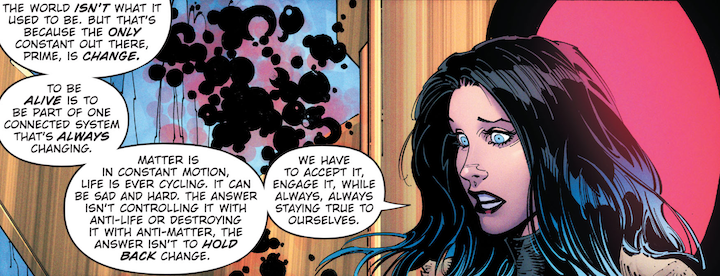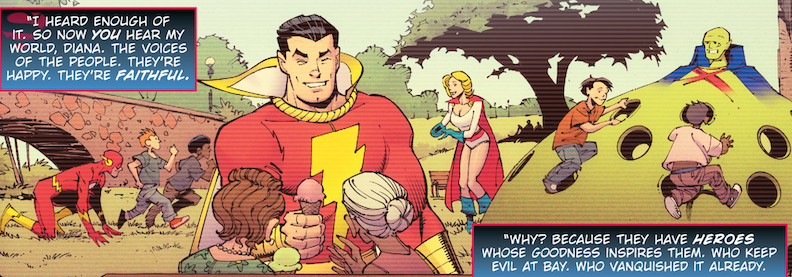Scott Snyder writes a treatise on the nature of DC Comics’ Crises through the eyes of Superboy Prime.
Dark Nights Death Metal 4
Written by Scott Snyder
Pencils by Greg Capullo
Inks by Jonathan Glapion
Colors by FCO Plascencia
Dark Nights Death Metal labels itself as an “Anti-Crisis” – a not-so-subtle way of tying the big event to the history of DC Comics’ past 35 years of big events while also pushing back against the very concept. With the fourth issue of the series (as long as you don’t count the plethora of tie-ins the publisher released last month), we get the strongest ties to – and push-back against – the very nature of a DC Comics Universe Crisis.
As they attempt to combat the Batman Who Laughs – now the Darkest Night – Batman, Wonder Woman and Superman are tossed into pivotal moments from the previous multiversal Crisis events. Though the situations are anything but what they expected. Instead of inserting themselves into past moments that made up (or tried to destroy) the multiverse, the Trinity is sent to Dark Multiverse reflections.
Batman is sent to a Crisis on Infinite Earths where the Anti-Monitor succeeded in ridding existence of positive matter. Superman lands in a Final Crisis where Darkseid unleashed the Anti-Life Equation and conquered all that he sees. And Wonder Woman finds a post-Infinite Crisis world where Superboy Prime succeeded in making the darker world he was railing against brighter.
It is here that Scott Snyder takes some very clear shots at the nature of DC Comics stories in the early part of the 21st Century, through the words of Superboy Prime. And he is countered by even more poignant words from Diana.

Did I say poignant? I think what I meant to say was that Scott Snyder used Diana to tell every comic book fan who’s complained about the grim nature of comic books over the years to get over themselves and start to roll with the punches. I mean, she’s not wrong but she’s not right either.
We’re in a very different world than the one that existed when Superboy Prime was created. It’s a very different world, even, than the one we lived in when Superboy Prime was turned into a very angry, very murderous avatar of angst in Infinite Crisis.
That shouldn’t mean, though, that we should be completely OK with a medium that was created as escapist fantasy slowly getting consumed by the real world problems that we deal with every day. When Jerry Siegel and Joe Shuster first wrote Superman in 1938, he was a strongman in a circus costume who fought for the downtrodden against fat cat landlords and others who would take advantage of people. He was a golem for good, and despite the evolution of the character, his sense of right and wrong has endured for more than 80 years now.
A fair number of DC Comics’ big events over the last 20 years have centered around raging against the darkness that’s become too common and trying to instill some light. But the light never actually seems to come through in the end. The stories just get darker and the fights for the light seem to get more desperate.
In discussing this very battle, Dark Nights Death Metal continues with the meta-commentary while doing nothing to buck the trend. Writer Scott Snyder is, at the very least, getting better with his attempts to copy Grant Morrison’s style, telling a cohesive story that incorporates too many concepts to adequately describe when explaining the story.
As Snyder continues to jam as many aspects of DC Comics’ Crisis History as possible into the story, the scope of the threat gets bigger and bigger, to the point where it’s hard to imagine the heroes managing to come out of it with a win. I don’t have any reason to believe that the DC multiverse will be brighter coming out of this series – it is, at the very least, more self-contained now than previous Crises. All I can hope for is that a glimmer still exists when this is all over.
